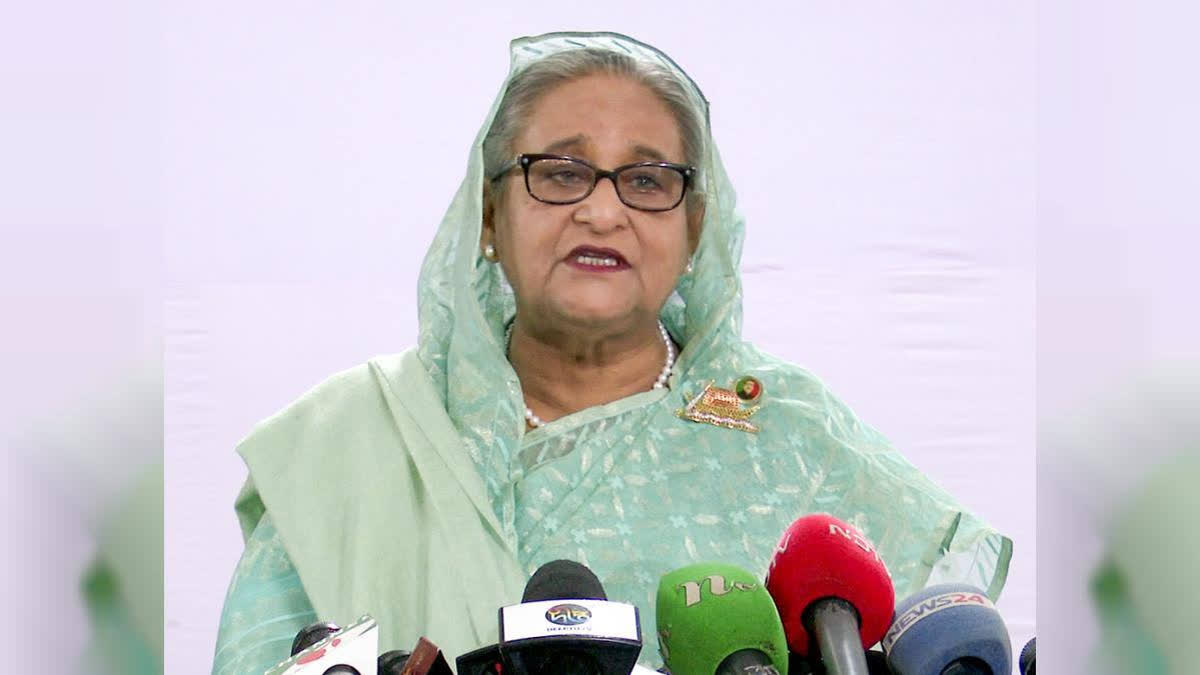A fifteen-year period of political stability in Bangladesh ended abruptly with the unexpected resignation of former Prime Minister Sheikh Hasina. History appears to repeat itself: nearly five decades ago, on August 15, 1975, the first president of liberated Bangladesh, Sheikh Mujibur Rahman, and his family were brutally killed in a coup led by the Bangladesh Army.
With Sheikh Hasina's regime now concluded, Bangladesh has joined the ranks of some South Asian nations facing a political crisis marked by violent conflict. Nationwide protests, primarily led by students opposing a policy that reserved 30% of government jobs for the descendants of participants in the 1971 Liberation War, are widely seen as a significant factor in the downfall of the Awami League-led government.
Additionally, external influences, such as the geopolitical competition between the U.S. and China and Pakistan's tacit support for radical elements, have further complicated the situation. While the student protests were an immediate catalyst and external actors played a more subtle role, two long-standing issues — limited democracy and the resurgence of Islamist forces — have substantially shaped the political landscape in Bangladesh and deserve closer examination.
Bangladesh's experience with democracy has been fraught with challenges and limited successes. The nation's foundational ideologies — nationalism, democracy, socialism, and secularism — have continually faced obstacles. The limited success of democracy in Bangladesh can be attributed to two interconnected factors.
First, political regimes, particularly those led by the Awami League, have been reluctant to fully embrace democratic principles. The assassination of Sheikh Mujibur Rahman in 1975 and the unseating of Sheikh Hasina in 2024, coupled with the autocratic tendencies of elected governments that left little room for opposition, have resulted in a fragile political environment. The striking parallels between Sheikh Mujibur Rahman's regime in the early years of Bangladesh's independence and Sheikh Hasina's fifteen-year rule — marked by the exclusion of opposition, rampant corruption, and autocratic decision-making — have significantly contributed to the legitimacy crisis faced by these regimes.
Sheikh Hasina’s second term, from January 2009 to August 2024, is particularly significant in Bangladesh's political history. After years of uncertainty and a military-backed caretaker government, the Grand Alliance, led by Sheikh Hasina, won a landslide victory in the December 2008 elections and assumed power in 2009.
The overwhelming mandate received by the Awami League in 2008 reflected the hopes and aspirations of the Bangladeshi people. While the government made strides in alleviating poverty, generating employment, and ensuring stability, it fell short in creating an inclusive and participatory political system. This was evident in the opposition's boycott of the subsequent general elections in 2014, 2018, and 2024. Critics argued that democracy in Bangladesh was regressing, with electoral processes marred by violence and fraud. Moreover, the public's perception of Sheikh Hasina's contribution to economic development began to wane as the government's performance in upholding democratic values — such as representation, rights, and the rule of law —declined.
In the absence of a strong, legitimate, and democratic opposition, which serves as a safety net in any democracy, the Awami League government struggled to maintain its hold on power amid organised violent protests by students, supported by the opposition, Islamists, civil society organisations, and ordinary citizens.
The recurring political instability in Bangladesh can also be attributed to the persistent resurgence of Islamist forces. Contrary to the belief that the formation of Bangladesh as an independent state discredited the "two-nation theory" that led to India's partition and the rise of "Political Islam," the resurgence of Islamism in Bangladesh has reaffirmed these concepts.
The various Islamist factions in Bangladesh — the Puritans, mystics, militant reformists, and Anglo-Mohammedians — despite their differences, share a common opposition to democratic governance in the country. The Islamist movement, which began as resistance against Hindu landlords, middle classes, and traders during the colonial era, now revolves around pro-Pakistan and anti-India narratives, opposing women's liberation and Western codes of conduct.
The ideals of political Islam once thought to be a spent force with the creation of Bangladesh, continue to challenge the establishment of a stable democracy. Notably, political Islam is not confined to Jamaat-e-Islami (JeI), the largest Islamist group in Bangladesh.
The measures taken by Sheikh Hasina's government, particularly the trials of war criminals and crackdowns on terrorists, including the subsequent banning of Islamist groups like Jamaat-e-Islami, managed to contain these forces temporarily. However, the deep-rooted social base of JeI allowed it to reconsolidate, even as many of its leaders were executed through war crime trials.
The resurgence of Islamist forces, especially JeI, supported by the main opposition party, the Bangladesh Nationalist Party (BNP), continues to pose significant challenges to the Awami League government. Over the past fifteen years, Islamist groups in Bangladesh have repeatedly mobilised protests to delegitimise and destabilise the Awami League.
The involvement of JeI and other Islamist groups in events such as the Pilkhana mutiny of 2009, the Hefazat-e-Islam protests demanding blasphemy laws, the 2016 terror attack claimed by ISIS, massive protests in solidarity with the Rohingya, and the student protests of 2024 cannot be overlooked. These protests, largely directed against the Awami League government, are invariably pro-Islamist, anti-democratic, and anti-India. Despite the government's heavy crackdown, Islamist forces have continued to regroup, while the Sheikh Hasina regime's attempts to appease Islamic sentiments arguably played into the hands of the Islamists.
Since its independence, Bangladesh has struggled to reach a consensus on the form of governance best suited for the nation. The ideas of Islamism often clash directly with the principles of democracy, nationalism, secularism, and socialism. While the Islamists' goal of establishing political Islam remains unrealised, their efforts present significant obstacles to the democratic process in Bangladesh.
The responsibility for the limited progress of democracy in the country lies with the elected governments, particularly the Awami League. Consequently, the ongoing political crisis in Bangladesh stems from the rejection of democracy by Islamist forces and the erosion of democratic principles by those in power.
(Disclaimer: The opinions expressed in this article are those of the writer. The facts and opinions expressed here do not reflect the views of ETV Bharat)



